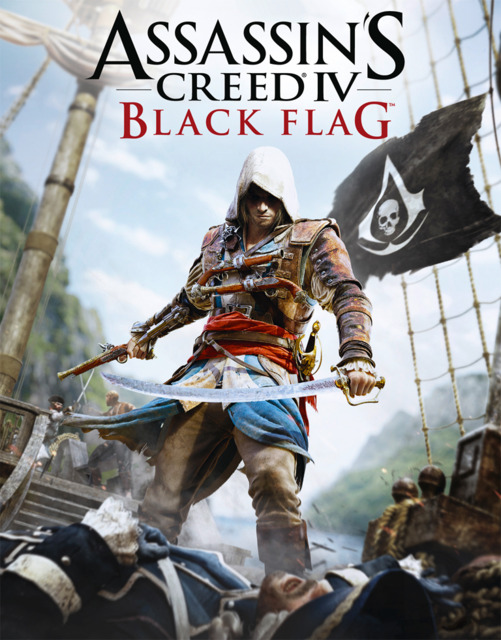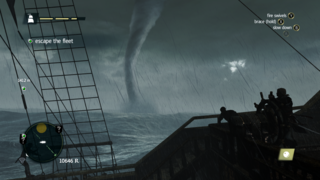Assassin's Creed IV: Black Flag review

It’s funny how it goes, sometimes. I’ve been pretty down on the state of AAA games for a while. Aside from a handful of great titles earlier in the year, the release schedule has been pretty bleak lately, filled with the kinds of games that make me embarrassed for the state of the medium, and sometimes its critics, too. Ironic, then, that it is an entry in a major, annualized franchise that has made me genuinely excited about blockbuster games again, doubly so because the last two major entries in the Assassin’s Creed franchise have been somewhat disappointing. Neither game managed to significantly shake up the formula, instead adding in new elements and systems that felt tacked on and out of place, like pineapple on pizza. Assassin’s Creed III added the excellent sailing mechanics, but struggled to meaningfully integrate it into the game. Similarly, Revelations had a woefully out of place tower defense-style mini game, which felt about as thematically appropriate as it sounds. Assassin’s Creed IV takes what worked in the previous entries, discards most of the superfluous mechanics, and focuses on its core strengths, resulting in a game that is the best entry in the series to date.
By simply excising the filler elements from previous games, Black Flag addresses one of the worst parts of the last two games: It took them hours and hours to stop teaching the player their myriad systems and properly get started. Edward Kenway, the protagonist of AC IV, acquires the tools of the Assassins’ trade almost immediately, and it’s a refreshingly slim tool set. The lean weapon selection gives the player the required tools to expedite combat, escape it, or avoid it altogether, without complicating things by having the ability to create a hundred kind of bombs, like Revelations did. There are some getting-to-know-you missions in Havana before Edward acquires the Jackdaw, his ship, but the impatient player can get through these quickly enough, and even so they at least involve more than only walking and talking, like many of the early missions in AC III.
Once Edward, and the player, have their hands on the Jackdaw’s wheel, the game opens up in a grand way. The freedom of the beautiful Caribbean ocean is intoxicating at first, with opportunities to get into trouble presenting themselves regularly. It’s an absolutely gorgeous place, too, with its inviting clear blue water, even bluer skies, and white beaches. The first time I saw a whale splashing down close to the Jackdaw, my jaw hit the floor, and it happens infrequently enough that it doesn’t really get old. The ocean is dotted with little islands filled with side quests and treasure that beg to be explored. Best of all, there’s actually a reason to want to find treasure and earn money. Upgrading the Jackdaw is an expensive business that will have you eyeing the mini map for treasure chest icons, and it’s paced just right so that by the time it’s fully upgraded, the end of the game will most likely be in sight.
On land, it’s business as usual, and this is where the age of the underlying systems occasionally gets in the way of enjoyment. Combat can get repetitive, as it’s rarely challenging, and especially boarding enemy ships to get valuable upgrade materials grew to feel like a chore about halfway through. The free running mechanics are also in dire need of an overhaul, as it’s starting to feel overly clunky and mechanical, rather than liberating. Fortunately, these elements feel somewhat de-emphasized. It is easier to be stealthy or to avoid combat than it has been in past games, and combat encounters generally feel shorter. There is still satisfaction to be had in chaining a succession of kills together, even if it is mechanically shallow, or by planning a stealthy approach and executing on it, or using a berserk dart and simply letting the enemies kill each other while you watch or slip by unnoticed. It still serves the game moderately well, but I don’t think they can get away with reusing the same mechanics next year.

Naval combat is where the game shines, though. Ship combat requires some element of strategy when battling a force of several ships, as positioning and speed play an important role. Add in dense smoke clouds from the cannons, occasional severe weather conditions like hurricanes, rogue waves and twisters, and some truly intense and hectic battles can emerge. It feels, to use an overused word, cinematic, but without robbing the player of control. Enemy ships can be boarded when they are dead in the water, which is very cool at first, as you swing from your ship to theirs and fight amidst a smoking hulk alongside your crew, but it takes long enough that at some point I started wishing I could expedite the process somehow.
The disparate elements all work fine in their own right, but it’s the seamless nature of the experience is what makes it work. Simply standing on the deck of the Jackdaw, picking a destination on the map, sailing to it, letting yourself get distracted by something you see on the way, like a whale to harpoon, and then doing it, creates this sense of freedom that captures the essence of the ideal of being a pirate. The only loading screens are encountered when fast travelling or when going into one of the three major cities: Havana, Kingston and Nassau. It feels organic in a way that no past game in the franchise has. Contributing to this is the feeling that all aspects of the game reinforce one another. Most everything you do on land goes towards upgrading the Jackdaw, which will make you more powerful at sea. This lets you more easily take out naval forts, which unlocks new side quests, and so on. It’s a very satisfying feedback loop, something approaching holistic design.
Aside from the design of the open world, Black Flag's story is the most praiseworthy element of the game, though it goes largely unsung. Perhaps it isn’t what most would expect from a yearly franchise published by a major video game house, but it truly stands out here, surpassing previous games easily and setting a new bar for storytelling in open world games. Pushing aside most of the baggage of previous games, the story focuses on Edward Kenway and his friends and rivals, to great success. Unlike previous protagonists, Edward doesn’t actually become an assassin until very, very late in the game. He simply wants to get rich and live a good life. The story is a slow burn, but this works to the game’s advantage. Edward’s goals early on in the game mirror those of the player, and it isn’t until later on that Edward starts to wonder if he’s on the right path in life. His story is grounded in humanity, has a narrative arc that actually works as an open world game (an exceedingly rare quality), and eschews the sci-fi plot twists that characterized the endings of some previous Assassin’s Creed games. It’s still larger than life, but essentially it’s about men struggling to remain relevant in a world that’s leaving them behind, about identity and purpose, and about friendship and responsibility.
All of the disparate elements of Assassin’s Creed IV combine to create an experience that is much better than any one of its constituent parts might suggest in a vacuum. It gives the player the means to go out there and be a pirate, to explore and to fight, creating a great sense of freedom. Assassin’s Creed IV is simply a triumph in open-world game design.
Originally posted on my tumblr: http://dailygamed.tumblr.com/post/68487685548/assassins-creed-iv-black-flag-review